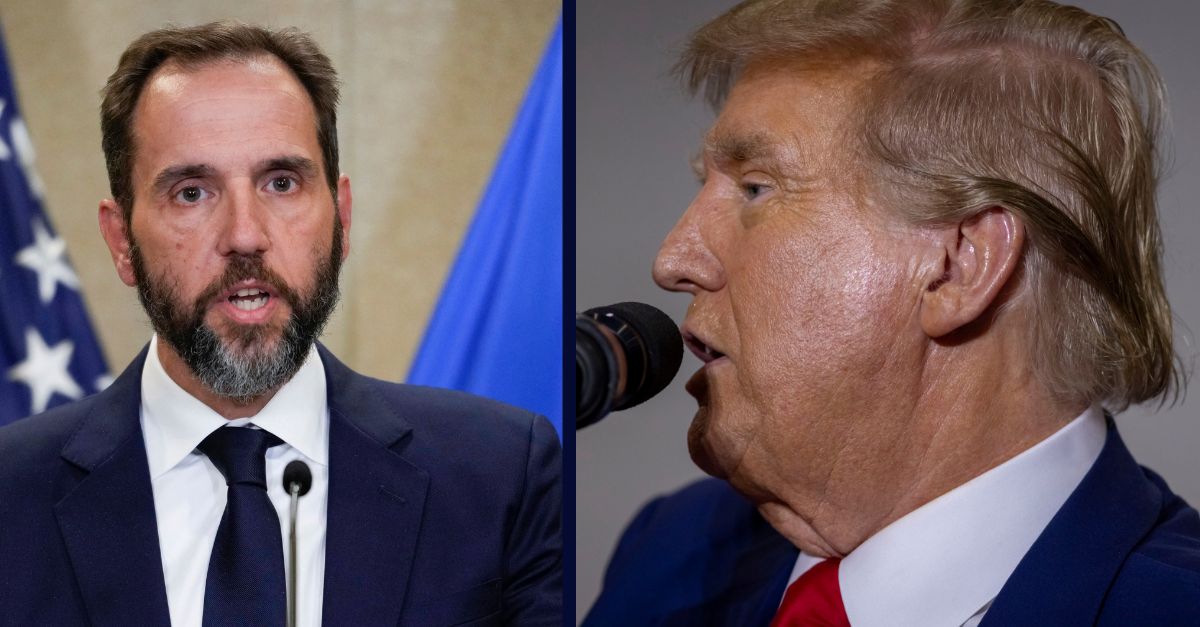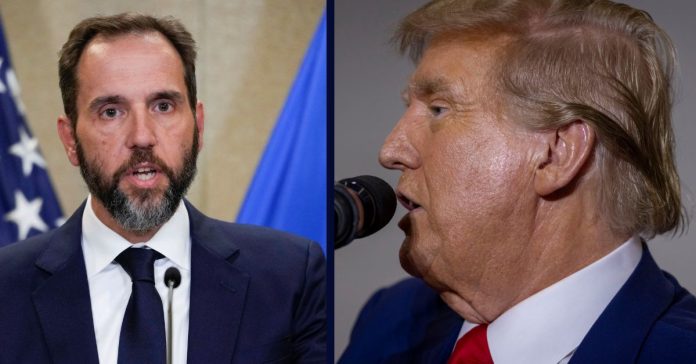
Left: Special counsel Jack Smith speaks to the media about an indictment of former President Donald Trump, Aug. 1, 2023, at an office of the Department of Justice in Washington. (AP Photo/J. Scott Applewhite, File). Right: Republican presidential candidate former President Donald Trump speaks Tuesday April 2, 2024, at a rally in Green Bay, Wis. (AP Photo/Mike Roemer)
On Wednesday, U.S. District Judge Aileen Cannon — the federal judge whose rulings in the Mar-a-Lago documents case against Donald Trump have raised eyebrows for appearing to favor the man who appointed her in late 2020 — allowed a motion to be filed in her court that positively pummeled the ex-president.
“Demonstrably incorrect” is just one way a group of constitutional lawyers and elected and federal officials — including a slew of former U.S. attorneys general — described Donald Trump‘s interpretation of the law as the former president pushes to have his Espionage Act indictment in Florida dismissed on grounds that special counsel Jack Smith was unlawfully appointed.
Nineteen experts signed onto the brief including former federal prosecutors like Donald Ayer, who served under George H.W Bush and Ronald Reagan; Stuart Gerson, a former acting attorney general; and Philip Allen Lacovara, former counsel to the special prosecutor during Watergate and drafter of the brief for the government in U.S. v. Nixon. Other government officials like former New Jersey governor Christine Todd Whitman and former U.S. Secretary of the Army Louis Caldera signed on as well as former U.S. Representative for Missouri and onetime Assistant Attorney General Tom Coleman. The full list of signatories along with the brief is available here.
In February, Trump’s lawyers filed a motion to dismiss the indictment due to what they argued was Smith’s “unlawful appointment and funding.” Smith was appointed as special counsel in November 2022 but should not have been, according to Trump, because the Constitution’s Appointments Clause and Appropriations Clause forbade the assignment of a “private citizen and like-minded political ally to wield the prosecutorial power of the United States.” Special counsel, Trump also contends, can only be approved with confirmation by the Senate.
As Law&Crime previously reported, that argument — which itself was supported by a pro-Trump amicus brief — was laid out by former Attorney General and co-founder of the conservative Federalist Society Edwin Meese III over a month ago and Smith had responded to it in kind in February.
“Neither Trump’s challenge nor the Meese Amicus’s additional theories are novel or meritorious; to the contrary, every court that has considered them has rejected them — including authoritative decisions by the Supreme Court,” Smith wrote in February. “And resolving the validity of the Special Counsel’s appointment would not lead to an accelerated appellate proceeding if Trump’s claim failed. Unlike with a non-frivolous immunity claim, Trump would have no right to an interlocutory appeal should the Court deny his Appointments Clause challenge.”
As the brief notes, the Appointments Clause of the U.S. Constitution authorizes Congress to vest power in the U.S. Attorney General to appoint what are known as “inferior officers” since the Attorney General is the head of the Justice Department. The U.S. Supreme Court ruled in 1974 and then clarified again in 1988 that a special prosecutor is empowered to probe and prosecute criminal matters as an “inferior officer.”
Trump’s arguments do not reflect this and are, as the filers wrote, “wholly without merit” and “mutually inconsistent.”
Part of that inconsistency stems from Trump’s position that “at best” Smith is an “employee,” the brief says. Yet his attorneys also write in their briefs that the special counsel’s office doesn’t dispute that the special counsel is an “officer” of the United States.
The Appointments Clause, however, states that: “[The President] shall nominate, and by and with the Advice and Consent of the Senate, shall appoint Ambassadors, other public Ministers and Consuls, Judges of the Supreme Court, and all other Officers of the United States, whose Appointments are not herein otherwise provided for, and which shall be established by Law; but the Congress may by Law vest the Appointment of such inferior Officers, as they think proper, in the President alone, in the Courts of Law, or in the Heads of Departments.”
The last portion was emphasized in the brief; while the clause gives presidents authority to appoint “principal officers with the advice and consent of the Senate” it is Congress that can vest its power to appoint “‘inferior officers’ in the President alone without the Senate’s consent, the federal courts, or the head of a department like the Attorney General,” the brief states.
In 2019, the brief notes, the D.C. Circuit found this binding precedent defined then-special counsel Robert Mueller as an “inferior officer.” Though the Supreme Court has been clear about the role a special counsel can play, it has not established an exclusive definition for how to distinguish between a “principal” and “inferior” officer. Nonetheless, the experts wrote, every factor the Court has considered weighs in favor of deeming Smith an “inferior officer.”
For one, as special counsel, Smith’s duties are limited and well-defined: He can only be appointed to investigate a criminal matter when its warranted, the filing says.
When Attorney General Merrick Garland appointed Smith, he set the parameters of Smith’s focus. The special counsel could only investigate whether any person or entity broke the law in connection with efforts to interfere with the peaceful transfer of power after the 2020 election or the certification by Congress on Jan. 6. He was also tasked to investigate Trump’s alleged illegal retention of classified documents.
“These express limitations reflect the narrow scope of the task assigned to the Special Counsel by the Attorney General: to investigate and, if necessary, prosecute crimes arising from two specific incidents related to the conduct of a single individual,” the brief states.
Smith’s role as an “inferior officer” is defined by the fact that he is empowered with no outside administrative duties and once his probe and prosecution of his assignments are over, unlike other typical prosecutors, Smith’s watch will have ended.
The very office itself is “temporary,” the brief underlines.
Smith is subject also to the “oversight, control and ultimately, removal” by the Attorney General even though he may not be subject to the “day-to-day” supervision like a typical lawyer inside the Justice Department. Federal regulations demand the special counsel report back to the attorney general with any major developments in their work, including if there are to be any extraordinary changes to an investigation or prosecution, the brief says.
Even then, a special counsel’s decisions aren’t final. The brief cites the late Supreme Court Justice Antonin Scalia who once wrote that what made the special counsel “significant” was that he has “no power to render a final decision on behalf of the United States unless permitted to do so by other Executive officers.”
“The problem, according to Justice Scalia, was that Congress had encroached upon the constitutional powers of the President by establishing the Independent Counsel as an officer who could not be removed but for cause. No such congressional encroachment is present with respect to the Special Counsel here. There is no statute that protects him from removal by the President or the Attorney General. The Department of Justice has adopted regulations that embody its policy decision about the Special Counsel’s removal, but as the Supreme Court has explained the Department could rescind those regulations at any time. Accordingly, the separation of powers problem that Justice Scalia identified with respect to the Independent Counsel in Morrison is wholly absent here,” the brief explains.
Trump also suggests that a special counsel is more powerful than U.S. attorneys but the experts say he cites nothing to back his claim. Trump’s lawyers argue too that it is “obvious” that U.S. attorneys are considered “principal officers” and that a special counsel “mirror[s] them.”
But again, the brief notes, there is no authority cited by Trump’s lawyers for that apart from “their own law review article … which contradicts the conclusion of the Office of Legal Counsel and every court to have addressed the question.”
It is jarring that Trump’s own argument and those of amici filing in support of the former president, like Meese, are so conflicted, the experts explained.
In one breath, the support briefs have argued that the special counsel actions are “ultra vires,” or beyond the bounds of his legal authority — and in another breath or filing, they contend Smith is a “mere employee” who cannot wield any real authority.
“Their sole argument for that remarkable conclusion is that special counsel’s position is not ‘continuing’ because it is not permanent. That argument is at war with precedent and reason,” the brief states.
Trump’s amici offer only a “convoluted argument” defying “both logic and binding Supreme Court precedent,” the brief argues
Have a tip we should know? [email protected]

